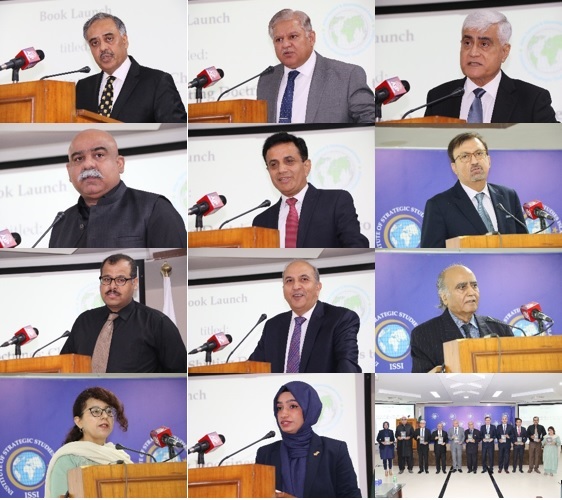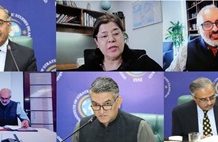Press Release
ISSI Launches Book on “Emerging Threats and Shifting Doctrines:
Challenges to Strategic Stability in South Asia”
August 31, 2023

“India was feverishly indulged in unprecedented increase in its fissile material stockpile and acquisition of all kinds of weapon systems and technologies, posing great risk to this region and beyond,” stated Lieutenant General (Retd) Sarfraz Sattar, former Director General, Strategic Plans Division (SPD), in his keynote address at the launch of a book titled Emerging Threats and Shifting Doctrines: Challenges to Strategic Stability in South Asia, edited by Malik Qasim Musfata. The event was hosted by the Arms Control & Disarmament Centre (ACDC) at the Institute of Strategic Studies (ISSI). Speakers on the occasion included: Major General (Retd) Ausaf Ali, Advisor, SPD; Malik Qasim Musfata, Director ACDC-ISSI; Ms. Ghazala Yasmin Jalil, Research Fellow ACDC-ISSI; Dr. Aqeel Akhtar, ACDA, SPD; Dr. Ahmad Khan, ACDA, SPD; Ms. Aamna Rafiq, Research Associate, ACDC-ISSI; Air Commodore (Retd) Khalid Banuri, former DG, ACDA, SPD; Dr. Adil Sultan, Dean, FASS, Air University, Islamabad.
Lt. Gen. (R) Sarfraz Sattar said that this book was a second breath of fresh air coming out of Pakistan’s strategic community this year after Ambassador Zamir Akram’s book on Pakistan’s Nuclear Deterrence and Diplomacy. Topics covered in ACDC’s book were contemporary in nature, arranged in a logical sequence, and related to the subject of strategic stability. He added that Pakistan needed to brace itself for future contingencies where it could see the application of such a course to gain ascendency over a short span of time. There was already talk of such a thing happening around the next Indian elections. He concluded that India with its nuclear power has a hegemonic design and it will continue to pressurize Pakistan and force it to either fight or give in. This leaves us only with one choice, try to defeat this hegemony with whatever resources are available to us, short of war. If war is imposed then do whatever it takes to win it by improving the correlation of forces at the point of decision. He also commended the work of the ACDC-ISSI for writing such a valuable book.
Earlier, in his welcome remarks, Ambassador Sohail Mahmood, Director General ISSI, said that it was no exaggeration to say that the world, today, was at a major inflection point. There was an intensification of geopolitics and the proliferation of old and new threats, both in traditional and non-traditional security domains. Majorpower competition; raging military conflict in Europe; interlocking food, fuel, and financial crises; and long-standing unresolved disputes in different parts of the world, are serving to accentuate the existing faultlines and exacerbate tensions across regions. Meanwhile, a trend toward weakening of multilateralism was discernible. The strategic arms control and disarmament regime was crumbling. The process of re-armament of several countries and regions had commenced. The unregulated growth of AI and emerging technologies was raising risks of further global instability. On the other hand, there was still no comprehensive action to address the existential threat of climate change.
It was important to view the developments in South Asia against this backdrop. Without a doubt, the transformation in South Asia’s security environment had both global impulses and regional dynamics. The challenges that arose in its wake encompassed a wide range of issues – from doctrinal shifts and force postures to the development of Ballistic Missile Defence programs, military modernization, and conventional arms build-up. Equally, there was the emergence of threats in the cybersecurity domain, while the growth of emerging technologies and Lethal Autonomous Weapons Systems (LAWS) presents new challenges, he added. Different chapters of this book has focused on these challenges and their impact on strategic stability in South Asia. He shared his views on the uniqueness of each chapter of this book and concluded that in the rapidly transforming global landscape, it was vital for a state like Pakistan to be cognizant of the challenges in its neighborhood and find ways to effectively deal with them. Besides adding to the existing literature the book helps engender an informed discourse on the subject, he added.
Malik Qasim Mustafa, Director ACDC-ISSI, and editor of the book, while giving his introductory remarks about the book, stated that each chapter of this book was unique in a way that each highlighted the impact of shifting doctrines and various emerging threats and when all are put together, it presented a bigger picture. He added that India was shifting away from its positions and developing conventional and nuclear warfighting doctrines; modernizing and enhancing its conventional and nuclear weapons capabilities; pursuing hypersonic and ballistic missiles programs; increasing its naval build-up; adding a nuclear dimension, wanted to control the Indian Ocean as a so-called “net security provider; militarizing space developing LAWS and weaponizing AI, and the cyber domain.
Given the rapid technological revolution at the global level and India-Pakistan conflictual relations, Major General (Retd) Ausaf Ali stressed the need to take timely actions to address the risks generated by LAWS. In her remarks, Ms. Ghazala Yasmin Jalil said that India’s doctrinal transformation and precision strike weaponry eroded nuclear deterrence. In his remarks, Dr. Aqeel Akhtar said that the development of sea-based nuclear capabilities constitutes a significant component of India’s nuclear modernization which raises the risks of arms race instability, aggressive nuclear posturing, command and control related issues, and higher alert levels in the region. In his remarks, Dr. Ahmad Khan linked the Indian space ambitions with the changing South Asian strategic landscape. While identifying the consolidation trends of emerging military technologies and their integration into the Indian military doctrine and nuclear posture, Ms. Aamna Rafiq said that such transformations would provide an entire spectrum of opportunities to India for the initiations of short, intense, and lethal crises under nuclear threshold against Pakistan.
In his comments, Air Commodore (Retd) Khalid Banuri stated that this book brings out the issue of Pakistan’s security dilemma. The official manifesto of the BJP clearly states that there is a need to enhance the strike capability of India. Implications of Indian space militarization would have a profound impact on strategic stability in South Asia. Pakistan needs to maintain conventional and nuclear capability to keep the threshold low. In his comments, Dr. Adil Sultan stated after the 2019 crisis, India has moved rapidly to make qualitative and quantitative improvements in its air power and in the process of integrating it with its past capabilities. Any future crisis between the two nuclear neighbors might involve the use of unmanned vehicles as a cost-effective means to achieve a limited political objective. He thanked the authors and editor for their excellent work and highlighted the need for collective wisdom to build our narrative through credible research.
In his concluding remarks, Ambassador Khalid Mahmood, Chairman BoG ISSI, stated that strategic stability in South Asia was affected by extra-regional dynamics. A conventional asymmetry with India compelled Pakistan to go nuclear, making Pakistan a reluctant nuclear power in 1998. Ever since, the doctrines, postures, actions, and policies of India have eroded regional stability in the absence of any global oversight.
The launch was attended by academics, practitioners, former and serving Pakistani diplomats and officials, experts from think tanks, students, and members of the diplomatic corps in Islamabad.











